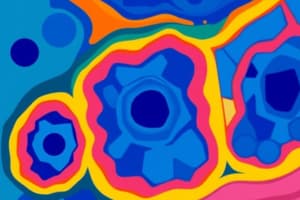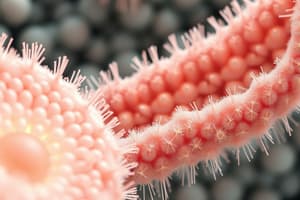Podcast
Questions and Answers
Which structure contains simple columnar epithelium responsible for secretion?
Which structure contains simple columnar epithelium responsible for secretion?
- Kidney
- Cornea
- Intestine (correct)
- Eustachian tube
What is a key characteristic of simple columnar epithelium?
What is a key characteristic of simple columnar epithelium?
- It is composed of flat cells.
- It features tall columnar cells with basal oval nuclei. (correct)
- It has multiple layers of cells.
- It lacks a basement membrane.
Which of the following locations is NOT associated with pseudostratified columnar epithelium?
Which of the following locations is NOT associated with pseudostratified columnar epithelium?
- Lacrimal sac
- Nasal air sinuses
- Kidney tubules (correct)
- Trachea
What function is primarily associated with ciliated columnar epithelium?
What function is primarily associated with ciliated columnar epithelium?
In which of the following areas does simple columnar epithelium with microvilli primarily function?
In which of the following areas does simple columnar epithelium with microvilli primarily function?
Which statement accurately describes the structure of pseudostratified columnar epithelium?
Which statement accurately describes the structure of pseudostratified columnar epithelium?
What feature distinguishes simple columnar epithelium in the stomach?
What feature distinguishes simple columnar epithelium in the stomach?
Which type of epithelial tissue is specifically found in the female reproductive system to facilitate movement?
Which type of epithelial tissue is specifically found in the female reproductive system to facilitate movement?
What is the primary function of yellow bone marrow in adults?
What is the primary function of yellow bone marrow in adults?
Which of the following bones contain active red bone marrow in adults?
Which of the following bones contain active red bone marrow in adults?
What percentage of total leucocytes do neutrophils typically represent?
What percentage of total leucocytes do neutrophils typically represent?
Which characteristic is true about the nuclei of neutrophils?
Which characteristic is true about the nuclei of neutrophils?
What type of granules are described as rich in hydrolytic enzymes in neutrophils?
What type of granules are described as rich in hydrolytic enzymes in neutrophils?
What role do granulocytes play in the immune system?
What role do granulocytes play in the immune system?
Which structure connects the segments of the neutrophil's nucleus?
Which structure connects the segments of the neutrophil's nucleus?
Which type of myeloid tissue can transform into red bone marrow under certain conditions?
Which type of myeloid tissue can transform into red bone marrow under certain conditions?
What is the typical lifespan of monocytes in the bloodstream?
What is the typical lifespan of monocytes in the bloodstream?
Which statement about monocytes is correct?
Which statement about monocytes is correct?
How are lymphocytes classified based on size?
How are lymphocytes classified based on size?
What percentage of total blood leucocytes do lymphocytes typically comprise?
What percentage of total blood leucocytes do lymphocytes typically comprise?
What component do macrophages NOT typically synthesize?
What component do macrophages NOT typically synthesize?
Which of the following features distinguishes large lymphocytes from small lymphocytes?
Which of the following features distinguishes large lymphocytes from small lymphocytes?
Which type of lymphocyte makes up the majority of small lymphocytes?
Which type of lymphocyte makes up the majority of small lymphocytes?
What is the main function of monocytes when they enter connective tissue?
What is the main function of monocytes when they enter connective tissue?
What is a characteristic of the nucleus of monocytes?
What is a characteristic of the nucleus of monocytes?
Which of the following is a trait of the cytoplasm in small lymphocytes?
Which of the following is a trait of the cytoplasm in small lymphocytes?
What is one of the main functions of macrophages?
What is one of the main functions of macrophages?
What type of cells are classified as pigment cells?
What type of cells are classified as pigment cells?
Which characteristic is NOT typical of macrophages?
Which characteristic is NOT typical of macrophages?
What is the primary role of pigment cells in the skin?
What is the primary role of pigment cells in the skin?
Which structure distinguishes adipocytes from other connective tissue cells?
Which structure distinguishes adipocytes from other connective tissue cells?
In what context would macrophages form a multinucleated giant cell?
In what context would macrophages form a multinucleated giant cell?
Which type of connective tissue cell is primarily involved in wound repair and scar tissue formation?
Which type of connective tissue cell is primarily involved in wound repair and scar tissue formation?
Where are histiocytes predominantly located in the body?
Where are histiocytes predominantly located in the body?
What is the primary function of osteoblasts in bone development?
What is the primary function of osteoblasts in bone development?
Which enzymes are rich in osteoblasts and facilitate the deposition of calcium?
Which enzymes are rich in osteoblasts and facilitate the deposition of calcium?
What cellular structure connects osteocytes to one another?
What cellular structure connects osteocytes to one another?
What happens to osteoblasts when they become surrounded by lacunae and calcified matrix?
What happens to osteoblasts when they become surrounded by lacunae and calcified matrix?
What is a significant characteristic of osteoclasts?
What is a significant characteristic of osteoclasts?
What role do osteocytes play in bone maintenance?
What role do osteocytes play in bone maintenance?
What is the origin of osteoclasts?
What is the origin of osteoclasts?
Which of the following components do osteoblasts synthesize?
Which of the following components do osteoblasts synthesize?
What is a function of alkaline phosphatase in osteoblasts?
What is a function of alkaline phosphatase in osteoblasts?
What distinguishes osteocytes from osteoblasts?
What distinguishes osteocytes from osteoblasts?
Flashcards are hidden until you start studying
Study Notes
Epithelial Tissues
-
Simple Cuboidal Epithelium:
- Lining of thyroid follicles.
- Covers kidney's convoluted tubules and small collecting tubules.
- Found in the anterior surface of the lens and inner cells of the choroid of the eye.
- Lines acini and small ducts of glands.
- Forms the germinal epithelium of ovaries in newborns.
-
Simple Columnar Epithelium (Non-Ciliated):
- Composed of tall columnar cells with basal nuclei; involved in secretion and absorption.
- In the stomach, secretes mucin; cytoplasm appears clear.
- In the intestine, features microvilli for enhanced absorption, rich in phosphatase enzymes.
- Lines the gall bladder, common bile duct, pancreatic duct, and large collecting tubules of the kidney.
-
Simple Columnar Epithelium (Ciliated):
- Formed of columnar cells with cilia on free borders for movement of particles.
- Present in the central canal of the spinal cord, brain ventricles, fallopian tubes, uterus, Eustachian tube, and some bronchioles.
-
Pseudo-Stratified Columnar Epithelium:
- Appears multi-layered due to irregular cell shapes and nuclear positioning, but consists of a single layer.
- Contains goblet cells for mucus secretion.
- Located in upper respiratory passages, Eustachian tube, and lacrimal sac.
Connective Tissue Cells
-
Histiocyte or Macrophage:
- Present in vascular connective tissue, especially in serous membranes and alimentary canal.
- Functions include engulfing foreign bodies, cleaning wounds, and forming multinucleated giant cells for large foreign bodies.
-
Pigment Cell:
- Found in connective tissues of the skin and eye, carries melanin pigments.
- Responsible for synthesis of melanin to protect from UV rays; sensitive to light.
-
Fat Cell (Adipocyte):
- Originates from mesenchymal cells, presents a signet ring appearance due to large fat globule.
Hematopoietic Tissue
- Myeloid Tissue:
- Yellow Bone Marrow: Composed of fat cells; serves as fat storage; can convert to red marrow under specific conditions.
- Red Bone Marrow: Present in sternum, vertebrae, ribs, skull, clavicle, and pelvis; active in blood cell production.
White Blood Cells
-
Granulocytes:
- Comprise neutrophils (60-70% of leukocytes), eosinophils, and basophils; involved in immune response.
- Neutrophils possess a segmented nucleus and are important for phagocytosis.
-
Monocyte:
- Larger leukocytes with a central, indented nucleus and abundant blue-stained cytoplasm.
- Transform into macrophages in connective tissue and play a role in phagocytosis.
-
Lymphocytes:
- Key players in immune response; divided into T-lymphocytes (75%) and B-lymphocytes (25%).
- Small lymphocytes have scanty cytoplasm, while large lymphocytes are more abundant with developed organelles.
Bone Cells
-
Osteoblasts:
- Derived from osteogenic cells; involved in bone formation by synthesizing collagen and minerals.
- Active during growth and healing of bones.
-
Osteocyte:
- Mature bone cells located in lacunae, unable to divide; they maintain bone matrix and calcium levels.
-
Osteoclast:
- Large, multinucleated cells responsible for bone resorption; originates from the fusion of monocytes.
- Plays a vital role in bone remodeling during ossification.
Studying That Suits You
Use AI to generate personalized quizzes and flashcards to suit your learning preferences.




